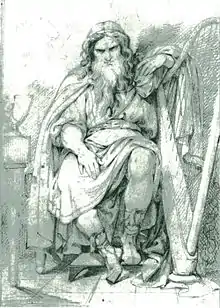Vetrliði Sumarliðason
Vetrliði Sumarliðason was a 10th-century Icelandic skald.
He was the great-grandson of Ketill hængr ("salmon"), one of the settlers of Iceland. He lived in Fljótshlíð, in the south of the island.
Vetrliði was pagan and opposed the conversion to Christianity. He composed defamatory verses (níð)[1] about Þangbrandr, a missionary sent to Iceland by Óláfr Tryggvason. He was killed by the priest (or by the priest and his companion Guðleifr Arason). In some versions, another skald, Þorvaldr veili, was murdered for the same reason. A stanza was composed by an unknown author about Vetrliði's death:
Ryðfjónar gekk reynir |
He who proved his blade on bucklers, |
| —Diana Whaley's edition | —The Story of Burnt Njal (98), Dasent's translation[2] |
This episode is related in many sources: Kristni saga, Landnámabók, Brennu-Njáls saga, Snorri Sturluson's Óláfs saga Tryggvasonar and Óláfs saga Tryggvasonar en mesta.
Only one stanza of his work survived, a lausavísa praising Thor for having killed giants and giantesses:
- Thou didst break the leg of Leikn,
- Didst cause to stoop Starkadr,
- Didst bruise Thrívaldi,
- Didst stand on lifeless Gjálp.
-
- —Skáldskaparmál (11), Brodeur's translation[3]
References
- According to Bo Almqvist (Norrön niddiktning: traditionshistoriska studier i versmagi. 2. Nid mot missionärer. Senmedeltida nidtraditioner. Stockholm: Almqvist & Wiksell, 1974), Vetrliði could have accused Þangbrandr of ergi.
- Dasent, George Webbe (trans.). 1861. The Story of Burnt Njal. Edinburgh: Edmonston and Douglas.
- Brodeur, Arthur Gilchrist (trans.). 1916. Snorri Sturluson: The Prose Edda. New York: The American-Scandinavian Foundation.
